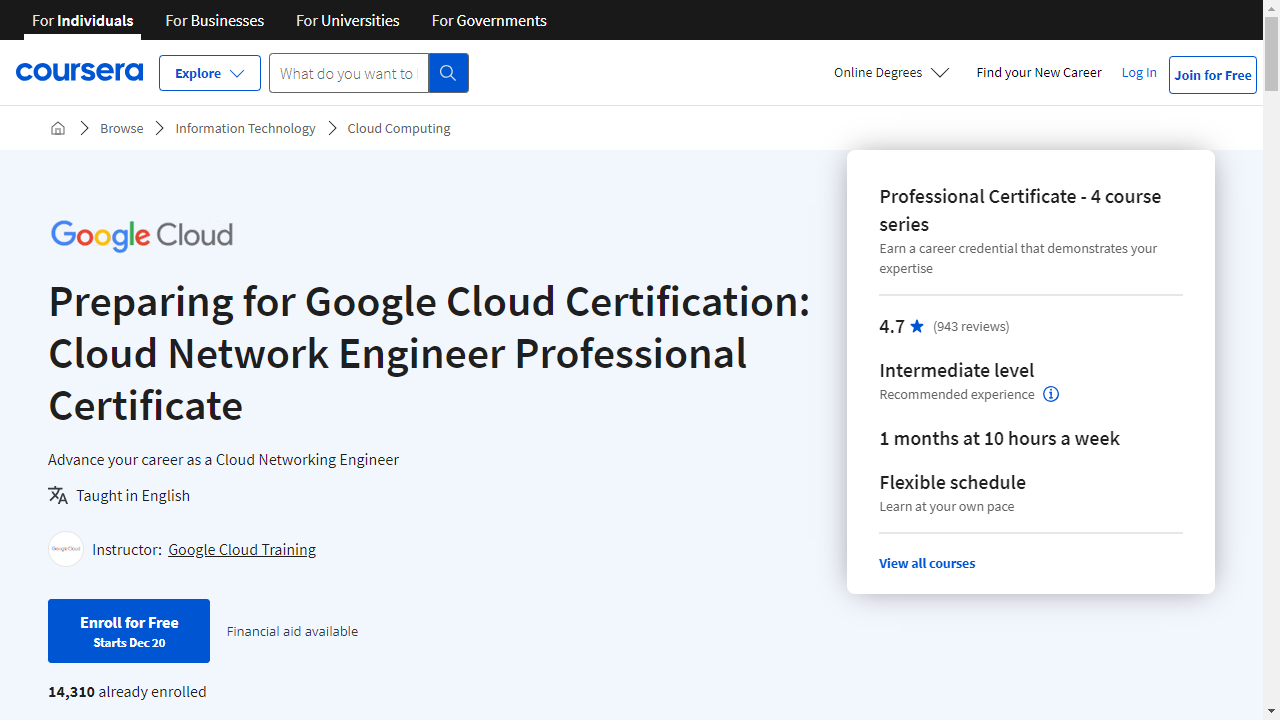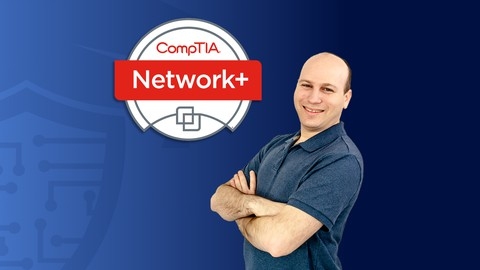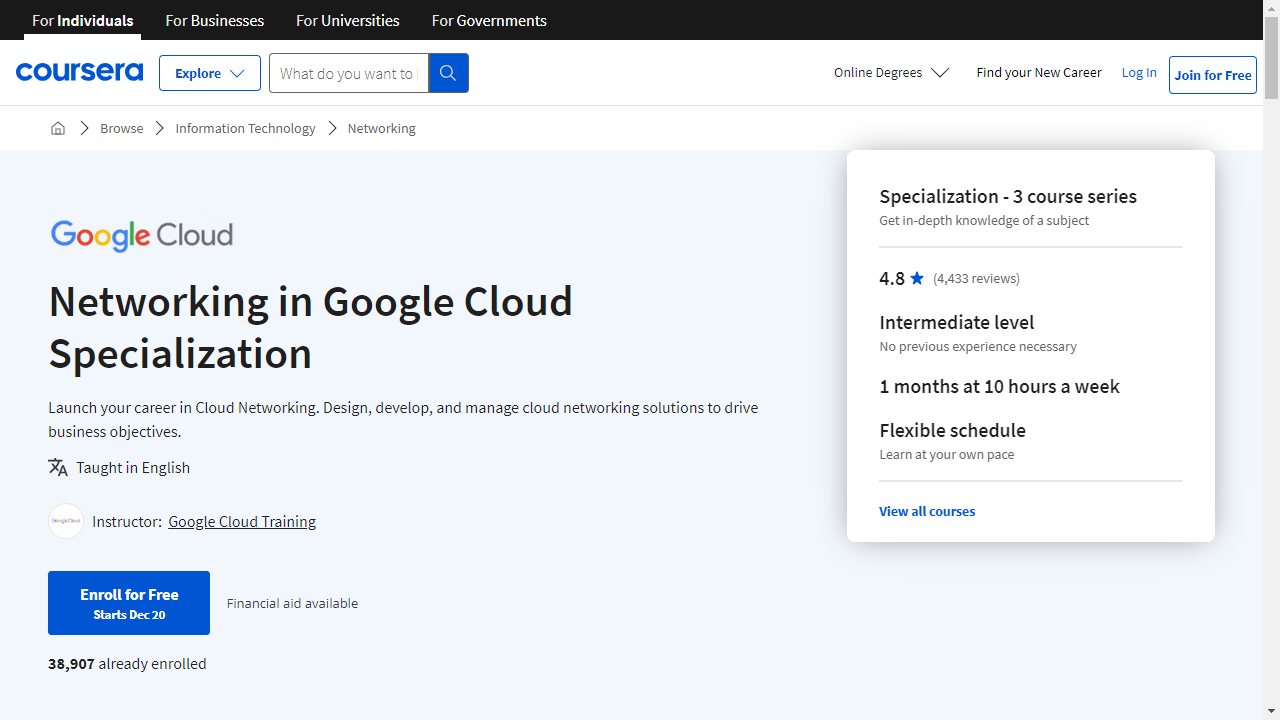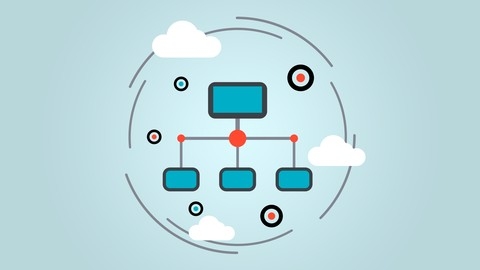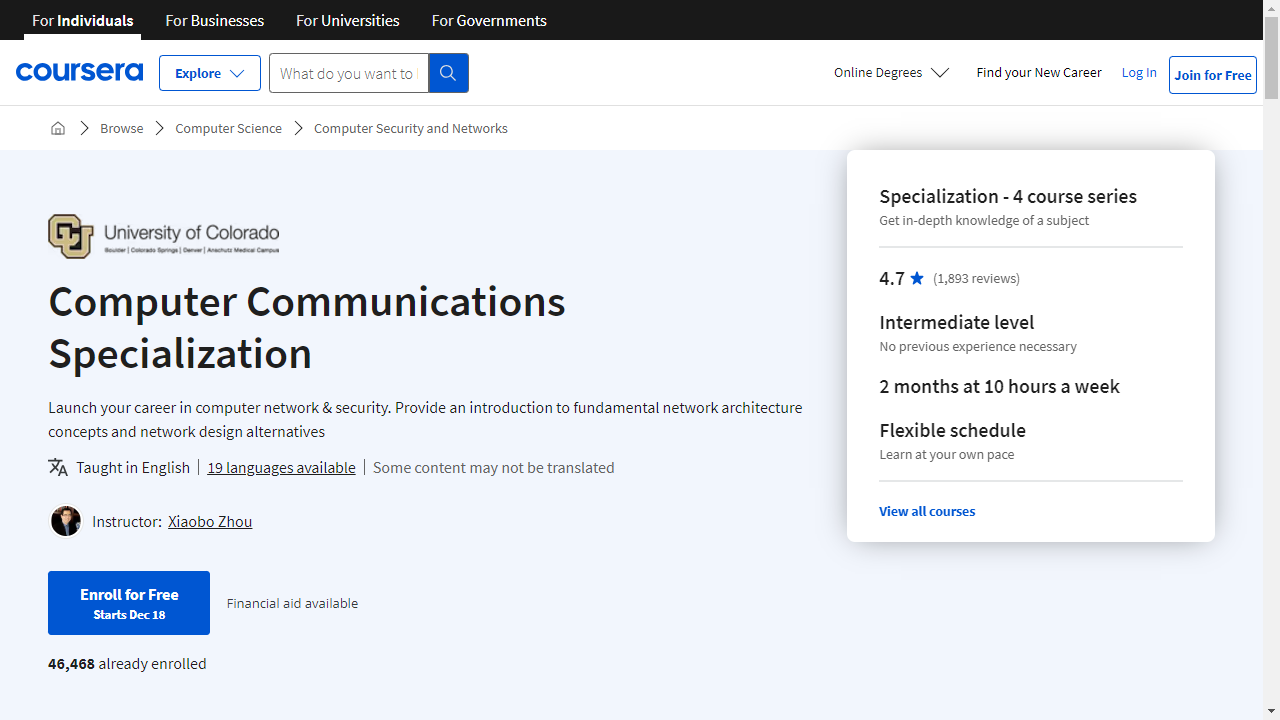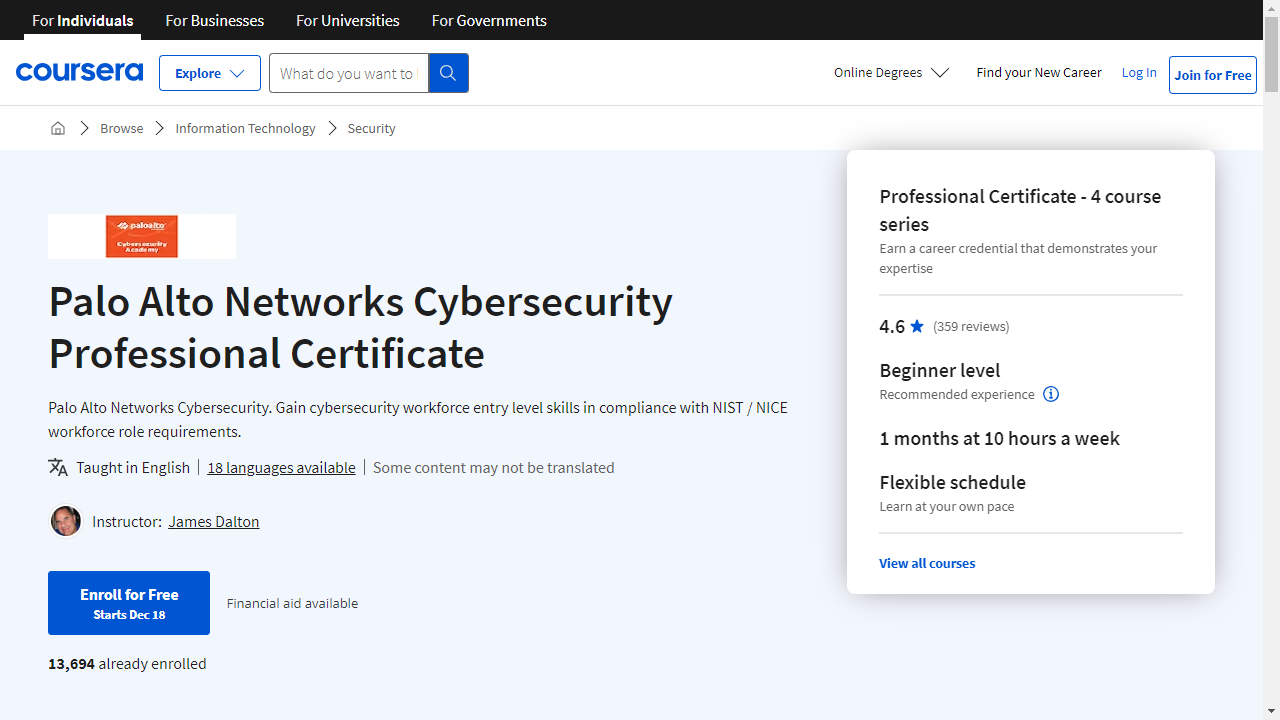Computer networking is the backbone of our interconnected world, enabling communication and data exchange between devices across the globe.
Understanding how networks function is crucial in today’s digital age, whether you’re a tech enthusiast, an aspiring IT professional, or simply someone who wants to grasp the technology that powers our daily lives.
By learning about networking concepts, protocols, and devices, you can gain valuable skills in troubleshooting, network design, and security, opening doors to a wide range of career opportunities.
Finding a comprehensive and engaging computer networking course can be a daunting task, with a plethora of options available online.
You’re searching for a course that covers the fundamentals, provides practical examples, and equips you with the knowledge to navigate the complexities of modern networks.
You might be overwhelmed by the sheer number of courses and unsure which one will best suit your learning style and goals.
Based on our research and analysis, we highly recommend The Complete Networking Fundamentals Course. Your CCNA start on Udemy as the best overall computer networking course.
This comprehensive course provides a solid foundation in networking, covering everything from basic concepts to advanced topics like routing and network security.
With its practical labs and clear explanations, it’s an excellent choice for both beginners and those looking to expand their networking knowledge.
However, this is just one of the many excellent computer networking courses available.
We’ve compiled a list of top-rated courses across different platforms, catering to various learning styles and levels of expertise.
So, if you’re ready to delve into the fascinating world of computer networks, keep reading to discover the perfect course for your journey!
The Complete Networking Fundamentals Course. Your CCNA start
Provider: Udemy
This complete networking fundamentals course thoroughly prepares you for the CCNA exam.
This course starts with the basics, teaching you how to install Packet Tracer on Windows and macOS.
You’ll grasp essential networking terms, like servers, clients, and ports.
The course then delves into networking history and the functions of various devices, including repeaters, hubs, switches, and routers.
You’ll dive deep into the TCP/IP and OSI models, understanding how data is transmitted as bits, frames, packets, and segments, using real-world examples like HTTP and FTP.
You’ll learn how to read and utilize binary and hexadecimal, crucial for interpreting network data.
The course then explores IP addressing, including IPv4, Subnet masks, and CIDR notation, using practical analogies to solidify your understanding.
You’ll then learn how to configure Cisco routers and switches, starting with the initial setup.
The course features practical labs using Packet Tracer, allowing you to apply your knowledge in simulated network environments.
You’ll explore cabling types and their impact on data transmission speed.
You’ll learn how to configure VLANs and utilize 802.1Q trunking for network segmentation.
The course covers advanced concepts like static and dynamic routing, focusing on protocols like EIGRP and OSPF.
You’ll learn about network security, including techniques to protect your network using tools like DHCP Snooping and Dynamic ARP Inspection.
You’ll explore concepts like network automation, cloud computing, and the fundamentals of SDN and OpenFlow.
You’ll also gain hands-on experience configuring and troubleshooting security features on Cisco devices, using both Packet Tracer and GNS3.
Preparing for Google Cloud Certification: Cloud Network Engineer Professional Certificate
Provider: Coursera
This Google Cloud certification program will help you become a networking pro.
You’ll begin with the basics, learning about Google Cloud Platform (GCP) and services like Google Compute Engine and Google App Engine.
You’ll understand how Google Cloud organizes and manages its infrastructure, giving you a solid starting point.
Next, you’ll dive into Google Cloud Networking.
You’ll explore Google Virtual Private Cloud (VPC) networks, learning to create and manage subnets and firewalls.
You’ll become skilled at controlling network access, sharing networks, and configuring load balancers.
You’ll also master routing traffic using DNS traffic steering.
You’ll then explore hybrid connectivity and network management.
This includes connecting your network to Google Cloud VPC networks and using private connections for secure access to external resources.
You’ll learn to choose the best Network Service Tier and use monitoring and logging to troubleshoot problems.
Finally, you’ll put your knowledge into practice.
You’ll use the gcloud command-line tool in hands-on labs to configure networks, perform essential networking tasks, and troubleshoot issues.
You’ll even get to install and test load balancers, gaining practical experience in a controlled environment.
You’ll finish this program prepared for real-world networking challenges and the Cloud Network Engineer Professional Certificate exam.
CompTIA Network+ (N10-008) Full Course & Practice Exam
Provider: Udemy
This CompTIA Network+ (N10-008) course on Udemy thoroughly explains the basics of networking.
You will learn about the OSI and TCP/IP models and dive into network parts like switches, routers, and wireless access points.
You will learn how to set up and fix wired and wireless networks.
The course also teaches you about network security.
You will learn about threats like phishing and denial of service attacks.
You will learn about security measures like firewalls, VPNs, and how to make networks more secure.
You will also find out how to use tools like Wireshark to analyze network traffic and troubleshoot problems.
You will learn about important security concepts, including the CIA triad, which stands for confidentiality, integrity, and availability.
You will explore network management, including performance metrics, policies, and troubleshooting methods.
This will prepare you to identify and solve common network issues.
This course will give you the skills to work with networks confidently.
You will be able to communicate with other IT professionals using the right terminology and be ready to take the CompTIA Network+ exam.
Networking in Google Cloud Specialization
Provider: Coursera
You want to learn how to build and manage networks on Google Cloud?
This specialization will teach you everything you need to know, from the basics to more advanced concepts.
You’ll start by learning about the fundamentals of Google Cloud, including Google Compute Engine and Google App Engine.
This foundation in cloud computing will prepare you for the rest of the specialization.
Next, you’ll dive into the world of Google Cloud networking.
You’ll discover how to set up Virtual Private Cloud (VPC) networks and subnets.
You’ll also learn about configuring firewalls and routing traffic using Domain Name System (DNS) traffic steering.
You’ll become familiar with load balancers and proxies and discover how to connect different Google Cloud projects.
The Google Cloud specialization doesn’t end there.
You’ll explore how to connect your network to Google Cloud, opening up a world of hybrid cloud possibilities.
You’ll learn about network design patterns and discover how to optimize your network’s performance and cost using Network Service Tiers.
You will also gain practical skills like setting up private connections to access external resources from internal networks.
Finally, you’ll learn how to monitor and troubleshoot your Google Cloud network using logging tools.
Introduction to Computer Networks for Non-Techies
Provider: Udemy
This course equips you with a solid understanding of computer networks, even if you have no prior technical knowledge.
You’ll begin with the fundamentals, learning what a network is and why they are essential in today’s interconnected world.
You’ll explore different types of networks, from small home setups to large enterprise networks, and understand the differences between architectures like peer-to-peer and client-server.
The course guides you through the core components of computer networks.
You’ll gain knowledge of protocols, the OSI model, and the TCP/IP model, which serve as the backbone of network communication.
You’ll discover how data traverses networks, grasp the concept of IP and MAC addresses, and delve into various network topologies.
You’ll become familiar with networking devices such as Network Interface Cards (NICs), hubs, switches, routers, modems, firewalls, and DHCP servers.
Through engaging hands-on labs using Cisco Packet Tracer, a powerful simulation tool, you can apply your knowledge.
You’ll learn to connect devices, create wired and wireless network topologies, and even configure a basic home Local Area Network (LAN).
The course provides a deep understanding of the OSI model, explaining each layer and its function in data communication, helping you visualize the encapsulation and de-encapsulation of data as it travels across the network.
You’ll explore essential networking concepts like TCP/IP, subnetting, IPv6, DNS, and network security.
You’ll acquire skills in configuring static and dynamic IP addresses, setting up DHCP servers, and implementing network segmentation techniques.
The course culminates with real-world case study scenarios, allowing you to design networks for various situations, applying your knowledge to practical applications.
Computer Communications Specialization
Provider: Coursera
This specialization by the University of Colorado System takes you on a journey through the world of computer networks, starting with the fundamentals and progressing to more advanced concepts.
The journey begins with “Fundamentals of Network Communication,” where you’ll uncover how networks have evolved and the key principles behind their design.
You’ll explore essential protocols like TCP and learn how networks support these services.
You’ll also delve into error control techniques, ensuring reliable data transmission.
Before starting, you’ll need some programming experience, preferably in C++ or Java, and a basic grasp of computer organization.
Next, you’ll explore “Peer-to-Peer Protocols and Local Area Networks,” where you’ll discover how data travels reliably even over unreliable networks.
You’ll also learn about different ways devices share access to communication channels in local area networks (LANs), including wireless LANs.
The journey then takes you deep into the world of “Packet Switching Networks and Algorithms.”
You’ll gain a comprehensive understanding of how these networks operate internally, including how data is routed and how congestion is managed.
This course equips you to understand how information flows across the internet.
Finally, you’ll reach “TCP/IP and Advanced Topics,” which delves into the core protocols of the internet.
You’ll learn how IP addresses work, ensuring the internet’s ability to scale to billions of devices.
You’ll also master the details of TCP, the protocol responsible for reliable data exchange.
The course concludes by introducing you to advanced topics like Multicast, SDN, and network security, giving you a glimpse into the future of networking.
Python Network Programming for Network Engineers (Python 3)
Provider: Udemy
This comprehensive course will teach you how to use Python 3 to automate essential networking tasks, saving you time and reducing errors.
You’ll begin by constructing a virtual lab environment using powerful industry tools like GNS3, EVE-NG, and CML, providing you with a safe and controlled space to practice.
You’ll then delve into the fundamentals of Python, mastering concepts like variables, data types, and control flow mechanisms such as loops and conditional statements.
You’ll gain a firm grasp of how to use Python to interact directly with Cisco devices using protocols like Telnet and SSH.
This foundation in Python equips you with the necessary skills to write efficient and reusable network automation scripts.
The course goes beyond the basics, introducing you to industry-standard libraries like Netmiko and NAPALM.
You’ll learn to leverage these powerful tools to streamline tasks such as configuring VLANs, managing BGP routing protocols, and automating device configuration backups across multiple devices.
You’ll discover how to interact with network devices, retrieve information, audit configurations, and implement changes – all programmatically using Python.
The course also exposes you to advanced techniques such as multithreading, allowing you to scale your automation efforts to larger, more complex networks.
Palo Alto Networks Cybersecurity Professional Certificate
Provider: Coursera
This program equips you with the skills to secure networks and protect against cyber threats, covering everything from basic concepts to advanced techniques.
You’ll start with the “Cybersecurity Foundation” course, building a solid understanding of modern computing trends, attack methods like Advanced Persistent Threats, and the different types of malware.
You’ll even get hands-on experience configuring a network interface and testing its security.
The program then dives deeper with “Network Security Fundamentals”, where you’ll master the core principles of network security.
This includes learning about perimeter security, setting up security zones on a Next-Generation Firewall (NGFW), and implementing authentication methods.
You’ll also discover how to create and test security policies, ensuring your network is protected.
With the rise of cloud computing, “Cloud Security Fundamentals” becomes essential.
This course teaches you how to secure cloud-based applications and services using Secure Access Service Edge architecture.
You’ll tackle the complexities of protecting traditional and hybrid data centers and dive into Docker, a popular tool for managing applications in the cloud.
Finally, “Security Operations Fundamentals” plunges you into the world of SecOps, the backbone of protecting businesses and their customers in the digital realm.
You’ll learn about the Security Operations Center (SOC), its continuous improvement processes, and how to leverage automation for threat identification and response.
You’ll become familiar with tools like Prisma Access, Traps, and Cortex Data Lake, all essential for today’s cybersecurity professionals.
Also check our posts on:


